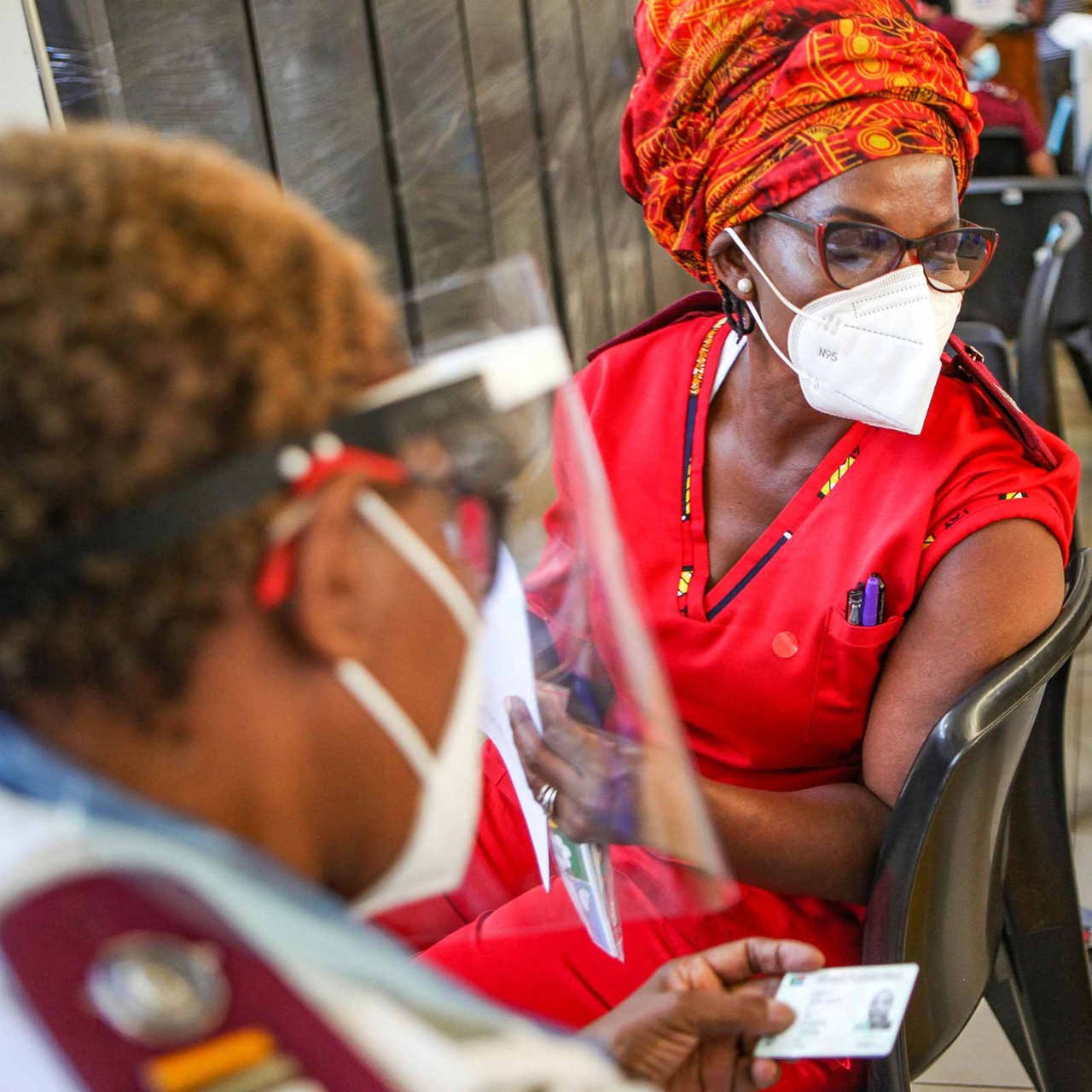
A recent roundtable brought together three ACCA Council members from very different parts of Africa to discuss their hopes and expectations for the future beyond the pandemic. The trio – from Mauritius, Nigeria and Zambia – face a range of different challenges but also identify common opportunities.

The island nation
Speaking from Mauritius, where he is head of compliance at Butterfield Bank, police officer-turned-finance professional Den Surfraz FCCA said that among the issues faced by the banking and finance industry, an increase in fraud looms large. ‘During the pandemic most people in the banking industry had to work from home. This required a lot of investment in IT systems, and now, as a result, we have seen a digital revolution. However, at the same time the risk of fraud has increased by 400%. Banks need to focus on finding ways of fighting those frauds and finding new ways to regulate their own staff.’
With businesses now used to operating remotely and using digital platforms for meetings, Surfraz said that many companies in Mauritius are vacating their offices, in part to save costs but also out of recognition that staff prefer to work from home. ‘IT companies are coming up with new ideas,’ he said. ‘AI and machine learning is becoming more and more important, which will allow financial companies to provide a better service to their clients, with more flexibility for staff.’
In the absence of visitors from abroad, Mauritius hotels have focused on providing new products for locals
Although Mauritius has been spared much of the health threat, its tourism industry – one of the main pillars of the economy, accounting for 25% of GDP – has been dealt a body blow by travel bans. ‘Although we have been Covid-free for a year, and the internal economy is working fine, the borders are still closed,’ Surfraz said. ‘In the absence of visitors from abroad, Mauritius hotels have focused on providing new products for locals.’
As an island, Mauritius also relies extensively on imports for many products. These too have been hit – by increasing freight costs and a rising US dollar.
Meanwhile, the government is pressing forward with vaccinating the island’s 1.3 million population so that the country can safely open its borders again. The shortage of doses is an issue, even for such a small population. However, as part of a move to reboot the crucial tourism industry, it has deemed frontline workers, including hotel staff and airline and airport employees, to be a priority group.
View from the west
Nigeria may not be as dependent on tourism as Mauritius but faces a bigger challenge in terms of keeping its people safe. With a population of more than 200 million, so far only 3.9 million vaccine doses have been delivered, mostly to frontline workers.
‘We began 2020 with so much optimism,’ Babajide Ibironke FCCA, CFO of integrated energy group Viathan, told the roundtable. ‘But that optimism was upended by Covid-19.’
Alongside the health crisis, his country has experienced widespread protests against police brutality. ‘The country is on a rough path, and we are seeing a very delicate recovery,’ he said, pointing to an economic growth rate of 0.11% in the final quarter of the year. ‘We are now technically out of recession, but the fall in government revenues has affected everything.’
As an oil exporter, the Nigerian economy was hit hard by last year’s oil price crash. This resulted in reduced fiscal revenue for the government, which in turn reduced the amount it available to spend on public services and Covid measures.
Foreign exchange (FX) was also an issue, Ibironke explained. ‘We import a lot of raw materials so the foreign exchange rate is key to all our supply chain activities, which in turn puts a lot of pressure on FX demand. As a result, with dwindling foreign exchange reserves – at around the US$34bn level – the Central Bank of Nigeria was forced to devalue the naira last year.
‘Now the challenge is to reopen everything that Covid-19 shut down,’ he added.
In his own organisation – an integrated power generation and distribution provider – Ibironke said working capital management is what keeps him awake at night. However, a dynamic forecasting process that incorporates machine learning is helping to manage liquidity in the business.
Landlocked in the south
Zambia faces some of the same issues. Like Nigeria, it relies on mineral exports (copper accounts for 70%–80% of Zambia’s export earnings), and like Mauritius, tourism is a significant part of the economy (Victoria Falls, on the border with Zimbabwe, is a key attraction). As a landlocked country, Zambia is also dependent on its neighbours; if South Africa or any other of its neighbours goes into lockdown, this has a knock-on effect on Zambia.
In her role as commissioner finance for the Zambia Revenue Authority (ZRA), Brigitte Nangoyi Muyenga FCCA has seen first-hand the difficulties facing many businesses and individuals during the pandemic. She told the roundtable: ‘Covid or no Covid, we have to work, because 80% of the government’s budget comes from taxes. But many taxpayers are now saying that, because of Covid-19, they are unable to pay their taxes, so we now need to give them some incentives and penalty waivers.’
Alongside time-to-pay agreements, ZRA has moved to a digital platform that allows for e-payment of taxes. ‘Covid-19 really challenged the way we have operated, but now 80% of taxes are paid using the digital platform,’ Muyenga said.
She added that many of ZRA’s employees are on the frontline, at borders and in tax offices dealing directly with the public, and so face a heightened risk of infection. ‘Many small businesses still prefer to visit our offices whatever the risks. We need to continue to ensure our frontline workers are safe and have adequate protective clothing.’
Nevertheless, Muyenga too has seen a shift to remote working in her organisation. ‘Many of us have been able to work from home, with board meetings held virtually and training carried out online, for example. It’s the way things are now. We need to do things differently and use digital platforms every day, including in our interaction with taxpayers.
‘No one is keen to pay tax, especially in these circumstances, but this is an opportunity for us to explain why tax is so important to the development of our country.’
People first
Looking forward, all agreed that the mental health of their people was likely to become a key issue. Surfraz said: ‘There is always the need for human contact, so we are looking at counselling for staff, and we need to understand that working from home might not be the best option for some.’
Ibironke pointed out: ‘The second wave of the virus has been worse, and I think we are likely to see more psychological trauma. We have not let anyone go, but to save costs we are looking at how our people can be more productive. We are putting people first, placing them at the core of what we are doing; that might mean we rotate teams so they work one week on, one week off.’
We have not let anyone go, but to save costs we are looking at how our people can be more productive
Despite the challenges, all three participants in the roundtable discussion see positives for the future. In Mauritius, for example, Surfraz said pollution levels have fallen as a result of people staying at home. ‘This is a good opportunity to rethink remote working and how it will help the environment,’ he said. ‘If the conditions are right, working from home will be the new reality for most companies around the world.’
Muyenga added: ‘The new normal of working from home, equipped with the necessary tools combined with the right ICT, can only help improve tax collection.’
The last word goes to Ibironke. ‘We are at the dawn of a new era,’ he said. ‘The rules have changed and will continue to change. We are now seeing technology strategies that can be scaled, and this will bring a fresh approach, opening up the secrets of a new economy.
‘To build back better, today’s businesses need to adopt a designed for disruption (DfD) model, as opposed to a business continuity or disaster recovery plan. For example, Covid-19 has taught us that we can actually work from home, and one of the unintended consequences of this reality is that many offices have suddenly become very expensive storage facilities. So decisions around office façade etc have to change. In future, companies must lean towards an elastic cost structure that can meet these changing needs.’



